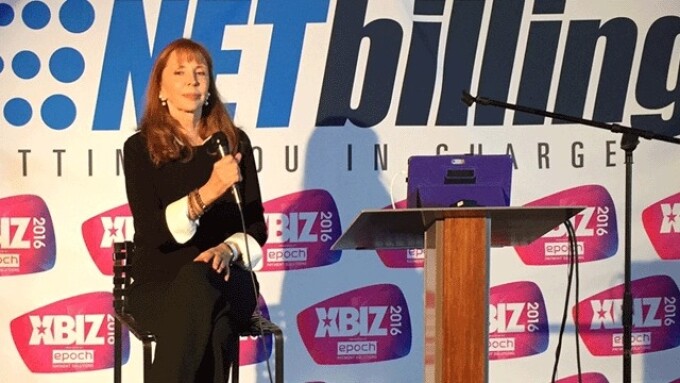WEST HOLLYWOOD, Calif. — Kelly Holland, managing director of Penthouse Entertainment, addressed 2016 XBIZ Show attendees on Thursday in a keynote address that took a wide look at how consumers view and react to brands.
Instead of giving a typical keynote on her life and pathway to success, Holland delivered to attendees something that offered “the big picture” — how effective branding can help build and sustain businesses, from mainstream to adult.
Holland became the executive producer for Playgirl TV in 2005, serving as its brand ambassador and international spokesperson while helping to launch their broadcast division. While at Playgirl she was responsible for creating the look and feel of the new channel as well as overseeing production.
In 2006, Holland joined Penthouse and as president of its entertainment unit she created the Penthouse Broadcast division. Today, with 10 channels in more than 100 countries Penthouse Television has become a global leader in adult broadcasting.
Six years later, in 2012, Holland took over leadership of additional divisions — Penthouse publishing, licensing and its clubs unit. Under Holland’s direction the Penthouse clubs division has expanded to 17 clubs worldwide.
Holland said that if it weren’t for her dedication to the vision of the brand’s core DNA, her company might not have continued on to where it is today — one of the top three adult entertainment brands — particularly in light of unparalleled challenges and pressures from changing technologies, a fractured global marketplace and a sophisticated millennial generation that prefers to see content on a computer screen, preferably a mobile device.
“What motivate’s my decisions?” Holland asked attendees at the standing-room-only event at the 2016 XBIZ Show. “It is honoring my brand, which I do honor.
“I respect it, I adore it and am always proud of it,” she said. “I am always proud of its history, and I feel that I am more of a shepherdess of the brand than more of a managing director or president.”
Holland noted that in the high-stakes environment of business it’s easy to chase the market and lose sight of a brand’s history and pathway.
“A brand is quite simply a promise,” she said. “It is not a product; it is a promise we make.”
Holland said that whether you’re a global brand, a B2B service provider, a performer or an individual entrepreneur your success depends on understanding your core brand and consistently communicating that message.
“The brands we think about are consumer-facing brands, but actors are their own brands, service providers are their own brands, agents are their own brands,” she said. “They make us promises and then a brand fails. Sometimes you make a promise and then something shifts, and then you get lost and your brand gets lost and fails. Sometimes brands don’t deliver and just fail.”
“It’s almost like a promise a lover makes, a parent makes – they trust you,” she said.
Holland went on to offer examples of brands that offered commercials that absolutely found success — Apple, as one example — as well as others that didn’t do so well — New Coke, which was introduced into the market in the 1980s and then failed with consumer appeal.
She also pointed out that nearly 25 years ago in adult, there were only 10 adult studios feeding consumers with VHS tapes.
“But now we have millions of content producers — called cam girls, amateurs and the Internet and YouTube — vying for hundreds of millions of eyes,” she said. “So for our industry it is important to understand and know how to resonate and cut through the brand noise.
“Figure out who you are, what your promise is and then stay very consistent with it.”
“Whether you are a B2B vendor, an actor, a photographer, a trade organization or a consumer-forward facing brand, just be respectful of the brand,” she said. “Honor it, vet the message of what you’re doing and try to be all things to all people — but that is the problem; you won’t be all things to all people.
“It is the desperate chase that causes you to lose sight of your brand.”








